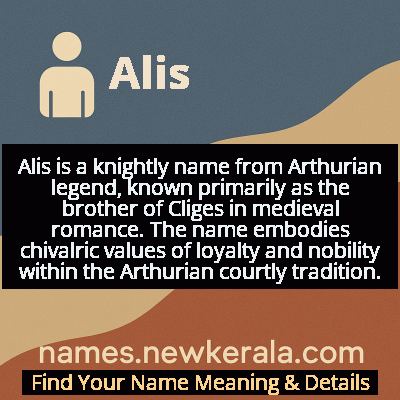Alis Name Meaning & Details
Origin, Popularity, Numerology Analysis & Name Meaning of Alis
Discover the origin, meaning, and cultural significance of the name ALIS. Delve into its historical roots and explore the lasting impact it has had on communities and traditions.
Name
Alis
Gender
Male
Origin
Arthurian
Lucky Number
5
Meaning of the Name - Alis
Alis is a knightly name from Arthurian legend, known primarily as the brother of Cliges in medieval romance. The name embodies chivalric values of loyalty and nobility within the Arthurian courtly tradition.
Alis - Complete Numerology Analysis
Your Numerology Number
Based on Pythagorean Numerology System
Ruling Planet
Mercury
Positive Nature
Adventurous, dynamic, curious, and social.
Negative Traits
Restless, impatient, inconsistent, prone to indulgence.
Lucky Colours
Green, white.
Lucky Days
Wednesday.
Lucky Stones
Emerald.
Harmony Numbers
1, 3, 9.
Best Suited Professions
Sales, marketing, travel, entertainment.
What People Like About You
Versatility, charisma, adventurous spirit.
Famous People Named Alis
Alis of Brittany
Arthurian Knight
Brother of Cliges in Chrétien de Troyes' romance
Alis le Fitz
Literary Character
Featured in medieval French romances as noble knight
Alis de Cornouaille
Legendary Knight
Minor knight in Arthurian cycles known for steadfastness
Name Variations & International Equivalents
Click on blue names to explore their detailed meanings. Gray names with will be available soon.
Cultural & Historical Significance
In the broader context of medieval literature, the name Alis appears in various French and English Arthurian texts, often as a knight or nobleman of good standing. The name's usage reflects the Norman-French cultural influence on Arthurian legends and demonstrates how names were adapted across linguistic boundaries while maintaining their aristocratic connotations. Alis embodies the medieval ideal of the loyal brother and faithful vassal, crucial themes in the chivalric code that defined Arthurian society.
Extended Personality Analysis
Individuals named Alis in Arthurian context typically exhibit strong loyalty, particularly in familial relationships, as demonstrated by Alis's relationship with his brother Cliges. This loyalty extends to their feudal obligations, showing a personality grounded in honor and duty. They often display the classical chivalric virtues of courage, courtesy, and steadfastness, making them reliable companions and trustworthy knights in Arthur's court.
The name suggests a personality that balances nobility with practicality, someone who understands their place in the social hierarchy while maintaining personal integrity. Alis characters tend to be supportive rather than seeking the spotlight, embodying the ideal of the faithful second-in-command or loyal sibling. Their strength lies in their consistency and reliability rather than flashy heroics, representing the backbone of the Arthurian chivalric system.
Modern Usage & Popularity
The name Alis has become quite rare in modern times, primarily appearing in historical fiction, Arthurian reenactment communities, and among enthusiasts of medieval literature. It occasionally surfaces as a distinctive choice for parents seeking unique names with Arthurian connections, though it remains far less common than other Arthurian names like Arthur, Lancelot, or Gawain. The name's usage is mostly confined to literary contexts and specialized interest groups rather than mainstream naming trends, with no significant presence in contemporary birth name statistics.
Symbolic & Spiritual Meanings
Symbolically, Alis represents brotherly devotion, feudal loyalty, and the supporting pillars of chivalric society. The name carries connotations of reliability and steadfastness rather than flashy heroism, symbolizing the importance of secondary characters who uphold the social structure. In metaphorical terms, Alis embodies the idea that true strength often lies in loyalty and consistent support rather than individual glory-seeking, serving as a reminder that every heroic narrative depends on its supporting characters.

